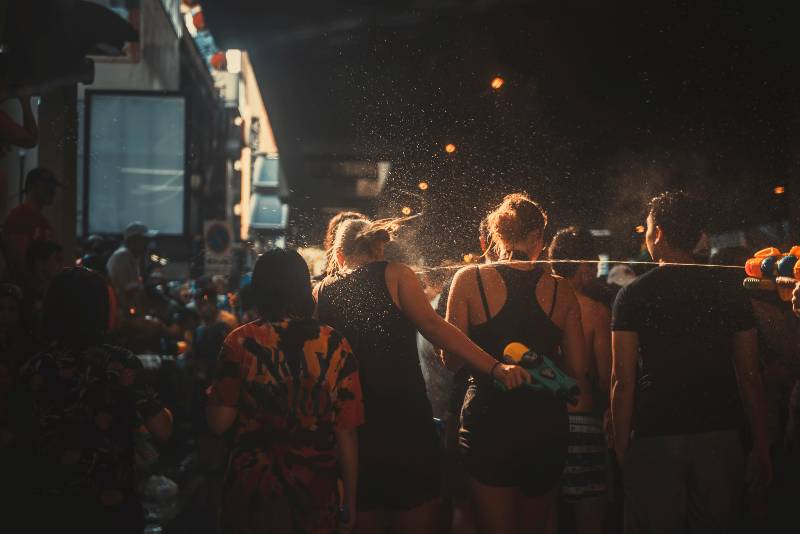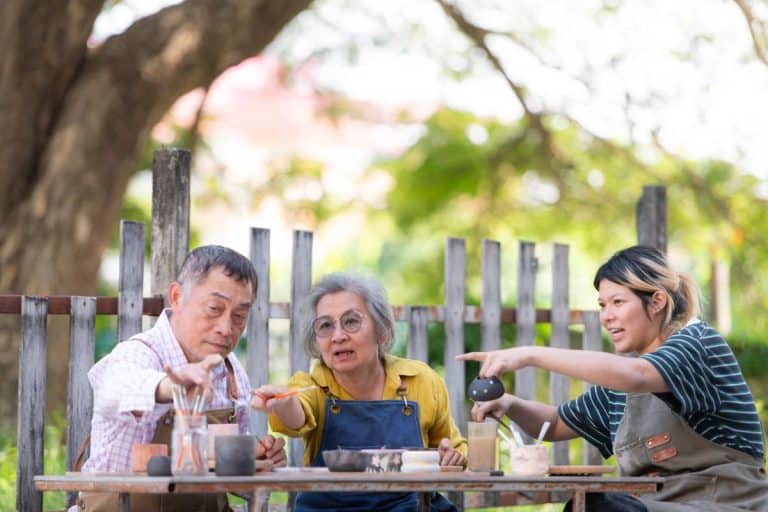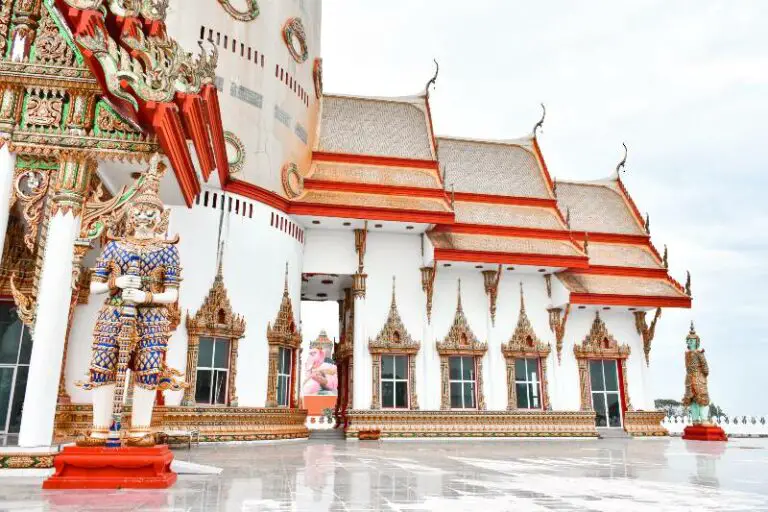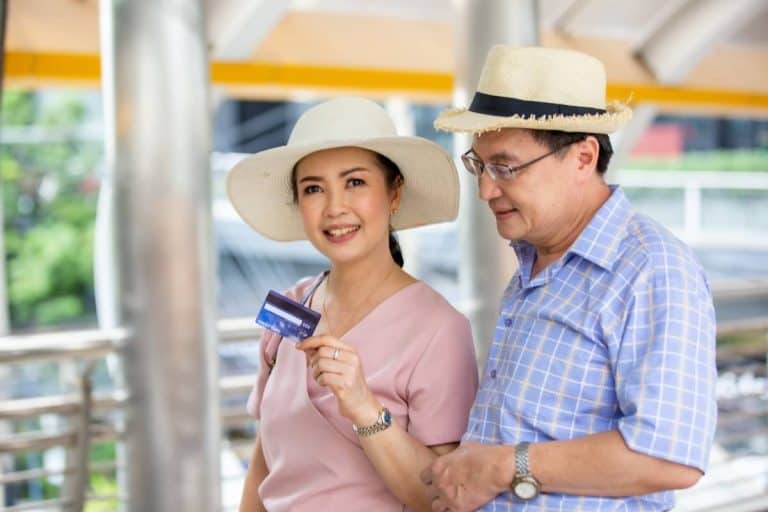A Traveler’s Guide to Celebrating Songkran in Thailand
For the Thai people, and those who visit Thailand, To celebrate Songkran is a time of great celebration! It’s that magical time of year when warm weather begins to roll in and every celebrated activity you can think of takes place around this national holiday. From splashing water at one another with buckets or hoses to paying homage to spirits by pouring water over Buddha statues, Songkran has been an iconic event in Southeast Asia for centuries. A festival marking the official start of summertime – come join us as we take part in the amazing festivities for Songkran 2023!
During Songkran, lively street parties come alive with boisterous music and an enormous, jovial water fight. Participants gather water in buckets, squirt guns, and any vessel they can get their hands on, before taking to the streets to playfully drench one another. It’s fortunate that April falls within Thailand’s hottest months, adding an extra refreshing touch to this spirited celebration!
Key Takeaways
- While modern celebrations are exuberant, they are based on historical and spiritual practices that pay homage to Buddha and show respect to elders.
- The festival signifies cleansing, renewal, and community bonds. It offers a unique blend of solemnity and spirited revelry.
- Visitors are encouraged to join the celebrations, but it’s essential to approach the festival with respect for its cultural and spiritual significance.
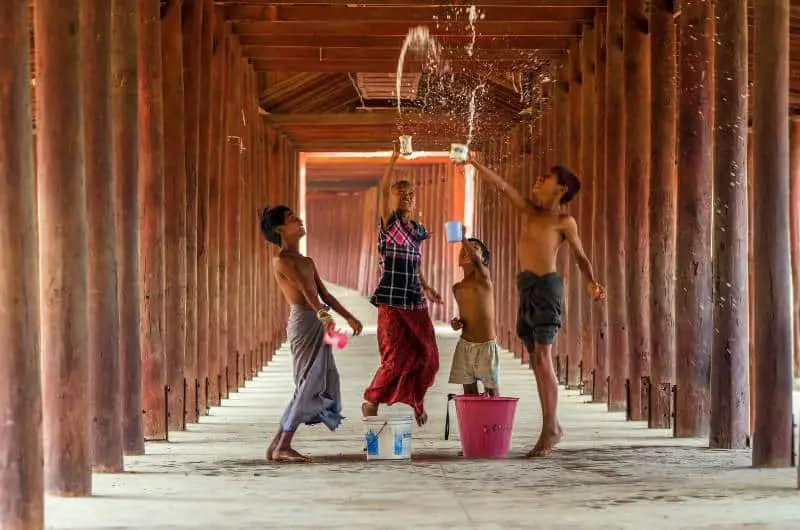
Historical Background
Origins and History of the Songkran Festival
Songkran is traditionally celebrated as the Thai New Year, marking the beginning of a new solar year and the start of the summer. Its origins lie in ancient Indian astrology, which associates this period with Aries the Ram – the first sign of the Zodiac. The word ‘Songkran’ itself comes from the Sanskrit language and translates to ‘passing’ or ‘approaching’, signifying the sun’s transition into a new Zodiac sign.
In the ancient times, Songkran was observed based on the lunar calendar, and its dates varied each year. Eventually, a fixed solar calendar was adopted, and thus Songkran came to be celebrated from April 13th to 15th annually.
Songkran incorporates elements of Buddhism, as the country is predominantly Buddhist. It traditionally begins with the act of ‘Merit Making’, which includes giving alms to monks, listening to temple sermons, and participating in the ‘Bathing of the Buddha’ ritual – a symbolic gesture of cleansing the body, mind, and spirit for the New Year.
Evolution over the Years
Over the years, Songkran has grown into a significant national holiday and a major tourist attraction. The traditional ‘Bathing of the Buddha’ ritual evolved into a nationwide water fight, turning the entire nation into a splash zone. This aspect of the festival symbolizes the washing away of sins and bad luck from the past year, and is seen as a wish for prosperity and good luck in the year ahead.
In addition to water fights, the festival now also features grand parades, beauty contests, lively music and dance performances, sand pagoda building competitions, and elaborate feasts featuring traditional Thai cuisine.
However, at its core, Songkran remains a time for family reunions and for paying respect to elders – a sacred event deeply integrated with Thai cultural and traditional values.
In recent years, there have been pushes to return Songkran to its roots and to celebrate in a more traditional and less water-intense manner due to environmental concerns, showing that the festival continues to evolve in line with societal attitudes and circumstances.
Key Traditions & Rituals
Songkran is one of the most popular festivals in Thailand, marking the beginning of the traditional Thai New Year. It is celebrated with great zeal and enthusiasm, and is filled with a plethora of traditions and rituals that showcase the rich cultural heritage of the country. The festival is a fascinating blend of vibrant festivities, religious customs, and time-honored traditions.
Key Traditions & Rituals
Water Splashing and Its Meaning
Water splashing is one of the most iconic traditions of Songkran. During the festival, Thais and tourists alike take to the streets for exuberant water fights. This tradition is rooted in the belief of washing away sins and misfortune from the previous year, and it is a symbol for starting the New Year cleansed and refreshed.
Visiting Temples
Visiting Buddhist temples is a significant part of the Songkran observance. Thais go to temples to make merit by offering food to monks, participating in candle and joss stick processions, and listening to dharma talks. Also, they pour water gently on Buddha statues, which is considered an act of cleansing and purification, promising good fortune for the New Year.
Making Merit and Giving Alms
Making merit and giving alms, especially food and daily necessities, to monks is an essential part of Songkran. It conveys religious devotion and also brings good karma, as it is believed that this act helps earn merit, improve life and ensure a better next life according to Buddhist belief.
Respecting Elders through the Rod Nam Dam Hua Ceremony
Respect for elders is a cornerstone of Thai culture and is highlighted during Songkran via the Rod Nam Dam Hua ceremony. During this ceremony, younger members of the family pour fragrant water into the palms of elders as a sign of respect and to seek blessings.
Traditional Foods and Dishes of Songkran
Songkran is incomplete without feasting on delicious Thai cuisine. Traditional dishes such as Khao Chae, a dish made from jasmine rice soaked in icy water and served with complementary sides, are prepared and enjoyed. Other popular Songkran dishes include Pad Thai, Kaeng Khoi, and Mango Sticky Rice. These foods are enjoyed with family and friends during Songkran, enhancing the festive spirit.
In conclusion, Songkran is a time of joy, merit-making, and family reunions, and these traditions and practices add vibrancy and profound cultural significance to the celebrations. The festival is an embodiment of Thai culture, reflecting respect for tradition, fun-loving nature, and the spirituality of its people. Whether you’re joining the water fights on the streets, giving alms at a local temple, or indulging in traditional Thai dishes, celebrating Songkran is a unique and unforgettable experience.
Modern Day Celebrations
Songkran is the traditional Thai New Year festival and is one of the country’s biggest celebrations. While it has important religious and cultural aspects, in recent years the festival has evolved to include more modern elements. From citywide water fights to extravagant parades, beauty contests and vibrant social gatherings, here’s an insight into the modern-day celebrations of Songkran.
Citywide Water Fights
One of the most iconic aspects of modern Songkran celebrations is the citywide water fights. Originally, gently pouring water over others’ hands was a sign of respect, but it has evolved into a fun-filled and exciting citywide water war. The streets of cities like Bangkok, Chiang Mai, and Phuket fill with people armed with water guns, buckets, and hoses, looking to drench each other. It serves as a reprieve from the April heat and resonates with the sense of joy and community the festival embodies.
Parades and Beauty Contests
Many districts host vibrant parades featuring colorful floats, traditional music, and dance performances. These parades often depict scenes from Buddhist mythology and offer a great blend of culture, tradition, and modern-day festivity.
A unique feature of Songkran is annual beauty contests, also known as “Miss Songkran,” where women dress in traditional Thai outfits and compete based on their beauty, grace, and knowledge of Thai traditions. These contests are not just about physical beauty, but also about cherishing and promoting Thai culture and heritage.
Songkran Parties and Concerts
Songkran doesn’t shy away from its share of modern society’s party culture. With the advent of tourism and the evolving local preferences, Songkran parties and concerts have become a staple in the festival’s modern rendition. Star-studded music events featuring local and international performers, electric dance music (EDM) parties, and lively gatherings are common occurrences, mainly in major cities like Bangkok and tourist hotspots like Pattaya.
These parties often include a fusion of traditional arts, like Thai drum performances and masked “Khon” dances, with contemporary entertainment. It’s in these gatherings where the old and new collide, creating a unique Songkran experience.
Songkran serves as a bridge between Thailand’s rich heritage and its dynamic modern culture. From spiritual rituals to boisterous water fights and lively social events, the festival captivates the essence of Thai culture and its joyful spirit. As modern features have been weaved into the festivities, Songkran has become a unique blend of tradition and modernity, attracting participants from all around the world.
Travel Tips for Songkran
Songkran, Thailand’s traditional New Year’s festival, is a celebration filled with joy, water fights, parades, and religious ceremonies. If you’re planning a trip to experience the spectacle firsthand, it’s essential to know the best places to celebrate, how to prepare and dress, and understand the significant cultural sensitivities of this vibrant event. Here are some tips to guide you.
When you’re planning a trip to Thailand, there are numerous things that you must know to ensure an amazing experience. One of the key aspects is to truly embrace the rich Thai culture. Immerse yourself in the local way of life by celebrating holidays like a local. Learn about their customs, traditions, and festivities to gain a deeper understanding of the vibrant Thai culture. For more insights on how to make the most of your visit, read our comprehensive guide here.
Best Places to Celebrate
- Bangkok: Being the capital city of Thailand, Bangkok offers bustling Songkran festivities. Streets like Silom and Khao San Road are transformed into massive water battlegrounds, while CentralWorld mall hosts one of the biggest Songkran concerts and street water fights.
- Chiang Mai: Often referred to as the Songkran capital, Chiang Mai’s celebrations are an incredible spectacle. Its festival highlights include a grand parade, Buddha image bathing, and a Miss Songkran contest.
- Phuket: Known for its beautiful beaches, Phuket also hosts an electrifying Songkran festival. Patong Beach is the center of the action, with beach parties, water gun fights, and colorful parades.
Preparing and Dressing for the Festivities
When dressing for Songkran, comfort and practicality should be your priorities. Remember, you’re likely going to get wet:
- Clothing: Wear lightweight, quick-drying clothing. Many Thais wear colorful Hawaiian-style shirts during Songkran, which are perfect since they dry quickly.
- Protection: Apply sunscreen and bring a hat or cap to shield yourself from the mid-April sun. Wear waterproof or water-resistant accessories.
- Valuables: Protect your belongings by using a dry bag to keep your phone, wallet, and other valuables safe from water.
- Footwear: Opt for non-slip shoes. Slippers or sandals are often the footwear of choice.
Cultural Sensitivities to Keep in Mind
While Songkran is certainly a joyous celebration, it’s also a deeply spiritual event with strong cultural significance:
- Respect for Traditions: Participate in the religious aspects of Songkran with the proper reverence. At temples, you’ll see locals gently pouring water over Buddha statues, a ritual believed to bring good luck.
- Politeness: Although water fights are part of the fun, it’s essential to play respectfully. Avoid soaking monks, the elderly, and anyone who isn’t actively participating in the festivities.
- Dress Appropriately: While you’ll likely get wet, remember to dress respectfully, especially when visiting temples. Revealing bikinis or minimal clothing isn’t considered appropriate.
Navigating Songkran as a traveler is an unforgettable experience with these tips in mind. Embrace the cultural and festive spirit of Songkran and enjoy a unique celebration that perfectly embodies Thailand’s vibrant energy and deep-seated traditions.
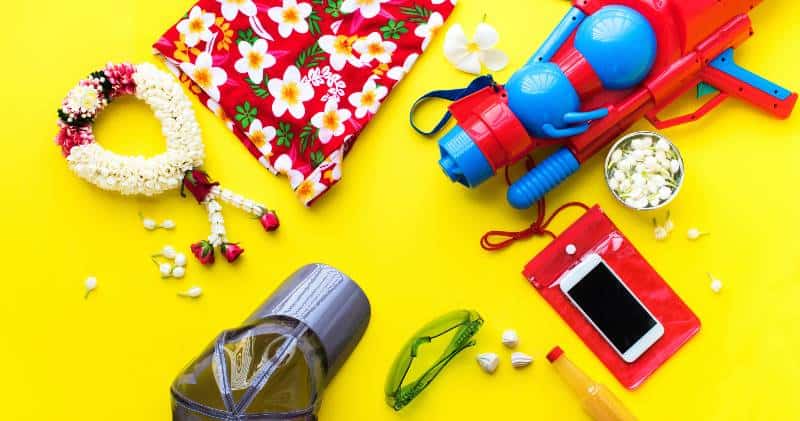
Celebrating Songkran in Thailand FAQs
What should you not do on Songkran?
Songkran is a time to celebrate and have fun, but it is important to follow certain cultural protocols. Refrain from getting into physical altercations and from consuming alcohol in public. It is also important to show respect for Buddhist temples, which are considered sacred places of worship, by dressing modestly when visiting them.
Is everything open during Songkran?
Most businesses, restaurants, and tourist attractions remain open during Songkran, although the hours may be shorter than usual. It is best to check in advance with any establishments that you plan on visiting during the festival.
How does Songkran bring people together?
Songkran is a time for family reunions, as many Thais return to their hometowns and villages to spend the festival with loved ones. The act of pouring fragrant water during the Rod Nam Dam Hua ceremony is also seen as a representation of bringing families together.
Is everything closed during Songkran?
No, most businesses remain open during Songkran. Some places may have shortened hours or be closed on certain days of the festival. It is best to check in advance with any establishments that you plan on visiting during this time.
Can you travel during Songkran?
If you plan to travel during the Songkran holiday period, anticipate potential delays for your journey. The Northern Bus Terminal in Bangkok tends to become chaotic during this time, resulting in heavy traffic congestion in the surrounding area.
Conclusion
The Songkran Festival is a reminder of the importance of celebrating and cherishing our community’s past, present and future. It’s an unique opportunity to express deep religious devotion in a fun festive atmosphere. Whether you plan to visit Thailand during Songkran or are curious about it from afar, we hope this post has provided you with insight into the meaning behind the festival.
With this information in mind, we welcome and invite you to participate in one of Thailand’s most beloved seasonal traditions. For travelers looking to dive deeper into their Thai experience, we recommend subscribing to our newsletter for the best information about living in Thailand or reaching out to us with questions. We wish you all a safe and joyful Songkran!
